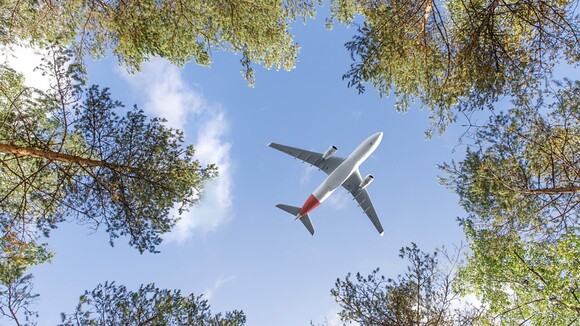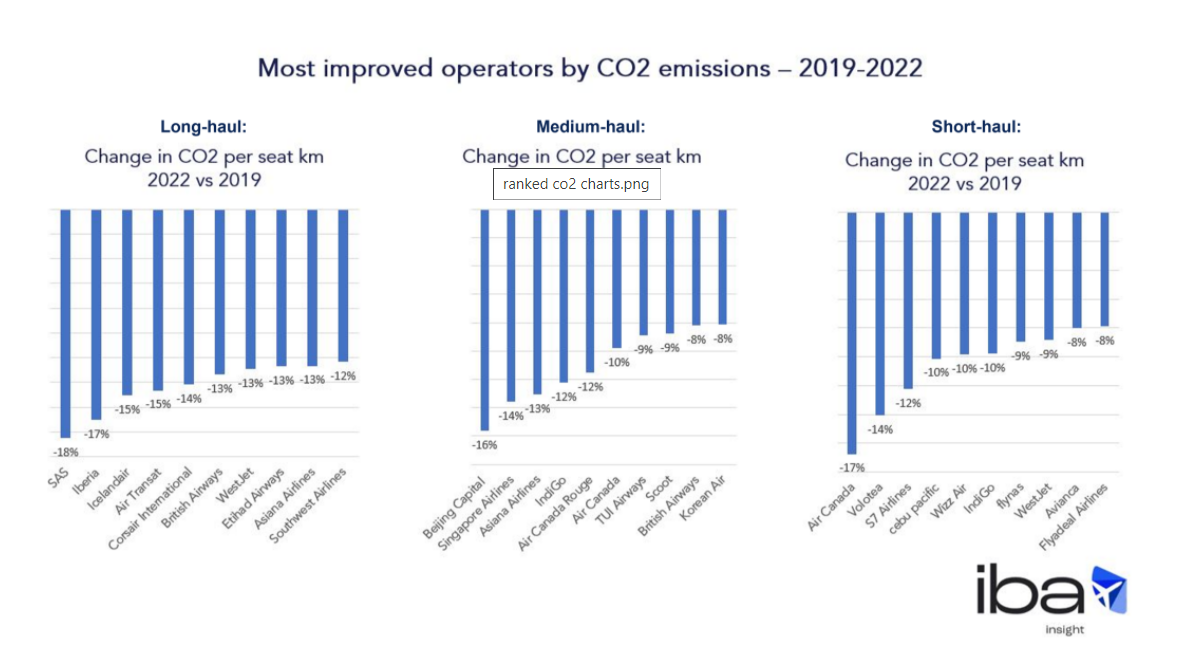Source: Iberia
- Since 2019 it reduced its emissions by 17%, according to a report by IBA Insight
- This improvement is driven by the renewal of its fleet -especially due to the addition of the new Airbus A350 for long-haul routes- and various operational and on-board weight reduction measures
- Iberia’s sustainability strategy is based on four pillars to achieve the decarbonisation of the airline industry
Iberia is the second airline in the world that has reduced its CO2 emissions the most on long-haul flights, according to the report by the independent aviation consultancy IBA, which monitors more than 65,000 aircraft and 35 million flights each year.
According to the report, since 2019 Iberia has reduced its CO2 emissions by 17% per seat-kilometre on its long-haul flights, for which there is currently no efficient alternative to air transport.
https://www.iba.aero/insight/ranked-the-most-improved-airlines-by-unit-co2-emissions/
According to ATAG, air transport represents 2.1% of global emissions, and flights longer than 1,500 kilometres account for 80% of emissions, so it is especially important to improve efficiency on these routes.
The IBA report attributes this decrease in Iberia’s CO2 emissions to the Spanish airline’s fleet-renewal strategy, which began in 2013, with the addition of the first twin-engine aircraft -the Airbus A330/300- to its long-haul fleet. In 2018, Iberia began to take delivery of its Airbus A350 aircraft, and in 2020, in the midst of the pandemic, it opted to bring forward the withdrawal of the Airbus A340/600, the last four-engine aircraft with which it operated its long-haul routes.
Fleet Renewal, Key to the Sector’s Decarbonisation
Along with the gradual recovery of its flight programme, Iberia has resumed its aircraft delivery schedule and, so far this year, it has received three A350s and five A320neos. The addition of these two models and the withdrawal of the A340 from its fleet, in the summer of 2020, significantly reduced fuel consumption. Currently, Iberia’s entire long-haul fleet is made up of twin-engine aircraft (A330s and A350s), which results in a reduction in CO2 emissions when compared to the four-engine A340s.
The A350 model is the quietest on the market and, in addition, it is 30% to 35% more efficient in terms of fuel consumption and CO2 emissions, thanks to its cutting-edge materials and the advanced design of its Rolls-Royce Trent XWB engines.
The A320neo is the most technologically advanced and efficient aircraft in Iberia’s short- and medium-haul fleet. Equipped with Leap-1A CFM engines, it is 50% quieter and 15% to 20% more environmentally friendly, emitting 5,000 fewer tonnes of CO2 per year and 50% less NOx.
The Sustainability Strategy, at the Heart of the Airline
The decarbonisation of the aviation sector is complex, but the industry currently offers solutions that can make an almost immediate impact on the path towards the ecological transition. In addition to its fleet-renewal strategy, Iberia is also implementing measures such as improving operational efficiency and using aviation fuel from sustainable sources, in order to reach its aim of achieving net zero emissions by 2050.
These initiatives are part of Iberia’s strategy to move toward the decarbonisation of the airline industry, which it is developing on the basis of four pillars:
- The green transition of the aviation sector , which includes all fleet renewal initiatives, more efficient operations, and the use of sustainable aviation fuels, among others.
- The development of a more sustainable travel experience for passengers, through the digitisation of services, the progressive elimination of plastic on board, the design of a waste-management system and carbon footprint offsetting.
- Training, raising awareness and encouraging action on sustainability for Iberia employees, with the aim of turning them into ambassadors of its strategy.
- Commitment to society, highlighting the value of everything that aviation contributes to society through connectivity, and support for R&D&i research through the Iberia Chair.
Social and environmental sustainability is also one of the pillars of Iberia’s strategic plan – Next Chapter – for the next three years, which, with the commitment of its employees, will allow the airline to secure its financial strength, position itself as the preferred airline among travellers, strengthen its position in the Madrid hub and work toward the green transition of the airline industry.


